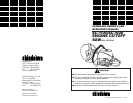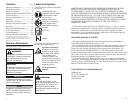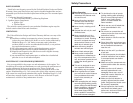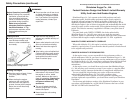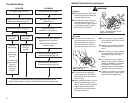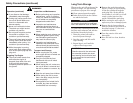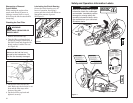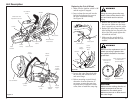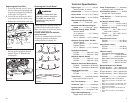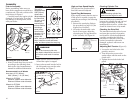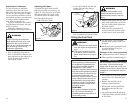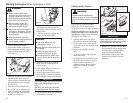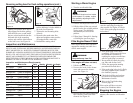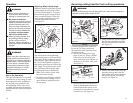
3
Before Operation
■ Children and people who do not
understand this manual must
not use this unit.
■ Never allow other people or
animals to be near the unit
when starting or operating.
■ Never touch a rotating cut-off
wheel.
■ Operate the unit only in a well
ventilated area.
■ Never operate the unit in a
closed area such as a room,
warehouse or tunnel. Running
the unit in a closed area may
cause serious illness or even
death due to exhaust gas.
■ Never allow any people or
animals near exhaust gas.
■ Never inhale exhaust gas.
■ Never make unauthorized
modifications or alterations to
any of the components of the
unit, and never operate the unit
without the wheel guard or
muffler.
■ This unit is designed for one-
man operation and must be
operated by only one person.
■ Never operate the unit when
you are tired or under influence
of any substance that could
impair vision, dexterity or
judgement.
■ When operating the unit, always
wear snug-fitting clothing, safety
gloves, safety non-skid footwear,
hearing protection, a dust-proof
mask, a helmet and goggles.
Never wear floppy clothing,
shorts, sandals or accessories
that could become entangled.
Safety Precautions
WARNING!
■ To minimize the risk of sparks
igniting clothing while operating
the unit, wear clothing made of
leather, wool, tightly-woven
cotton, or cotton treated with
flame-retardant.
■ Never use any cut-off wheel that
is not recommended in this
manual.
■ Do not start or operate the unit
unless you have a clear work area
and secure footing.
■ Never smoke or use fire near the
unit or its fuel.
■ Since the muffler and exhaust gas
become very hot, make sure there
are no flammable substances
near the unit.
■ Never run the unit if you discover
a fuel leak.
■ A first-time operator should obtain
practical instruction from a dealer
or an experienced user before
using the unit.
■ Make sure all the components are
in place and the bolts are securely
fastened.
■ Make sure the cut-off wheel is
securely fastened and is not
damaged. Never use a cut-off
wheel with cracks, distortion, or
one that is unbalanced.
■ Make sure the belt tension is
properly adjusted and the wheel
guard, belt guard and clutch cover
are securely assembled.
■ Always inspect the front handle,
rear handle and wheel guard
before use, and never use the unit
if the parts are damaged.
26
PARTS COVERED
Listed below are the parts covered by the Federal Emission Design and Defect
Warranty. Some parts listed below may require scheduled maintenance and are
warranted up to the first scheduled replacement of that part. The warranted parts
include:
1. Carburetor Internal Components
• Valve Assembly-throttle, Jet, Metering Diaphram
2. Ignition System Components
• Ignition Coil
• Flywheel Rotor
The emission control system for your particular Shindaiwa engine may also
include certain related hoses and connectors.
LIMITATIONS
The Federal Emission Design and Defect Warranty shall not cover any of the
following:
(a) conditions resulting from tampering, misuse, improper adjustment
(unless they were made by the dealer or service center authorized by
Shindaiwa Kogyo Co., Ltd. during a warranty repair), alteration,
accident, failure to use the recommended fuel and oil, or not perform-
ing required maintenance services,
(b) the replacement parts used for required maintenance services,
(c) consequential parts used for required maintenance services,
(d) diagnosis and inspection fees that do not result in eligible warranty
service being performed, and
(e) any non-authorized replacement part, or malfunction of authorized
parts due to use of non-authorized parts.
MAINTENANCE AND REPAIR REQUIREMENTS
You are responsible for the proper use and maintenance of the engine. You
should keep all receipts and maintenance records covering the performance of
regular maintenance in the event questions arise. These receipts and
maintenance records should be transferred to each subsequent owner of the
engine. Shindaiwa Kogyo Co., Ltd. reserves the right to deny warranty coverage
if the owner has not properly maintained the engine. Shindaiwa Kogyo Co., Ltd.
will not deny warranty repairs, however, solely because of the lack of repair,
maintenance or failure to keep maintenance records.



